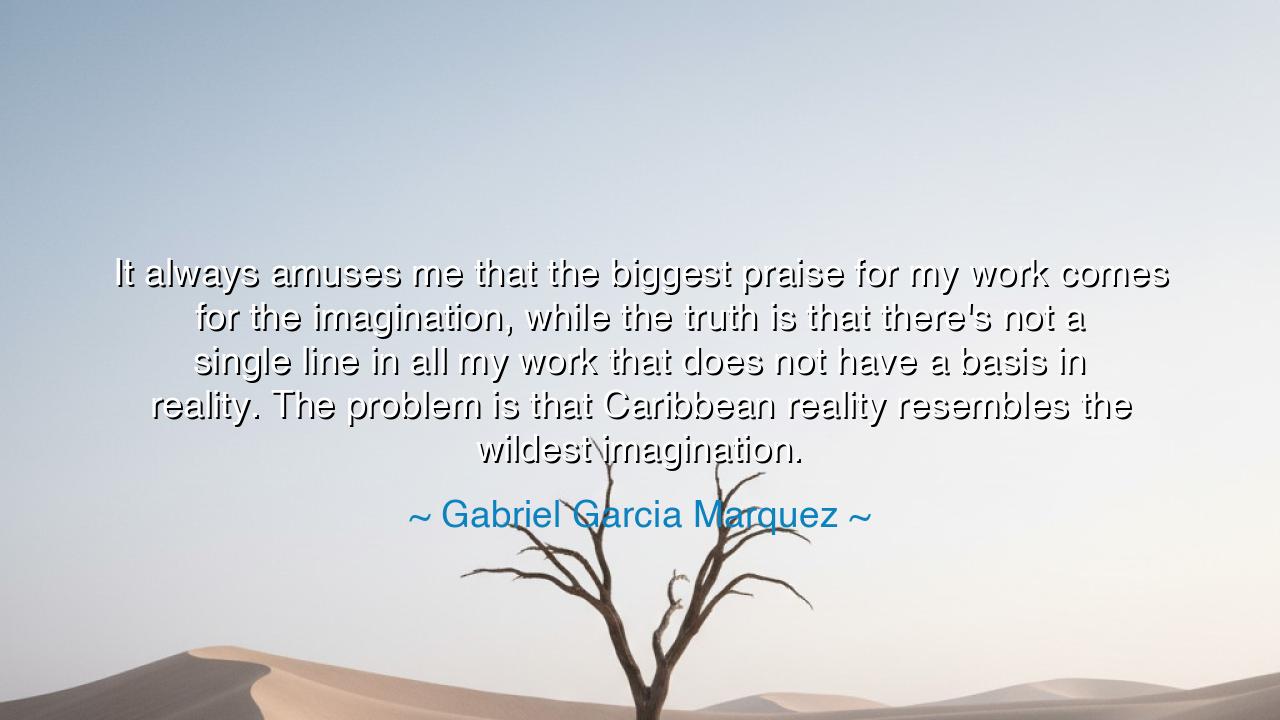
It always amuses me that the biggest praise for my work comes for
It always amuses me that the biggest praise for my work comes for the imagination, while the truth is that there's not a single line in all my work that does not have a basis in reality. The problem is that Caribbean reality resembles the wildest imagination.






“It always amuses me that the biggest praise for my work comes for the imagination, while the truth is that there’s not a single line in all my work that does not have a basis in reality. The problem is that Caribbean reality resembles the wildest imagination.” — thus spoke Gabriel García Márquez, the master of magical realism, whose pen transformed the ordinary into the extraordinary and revealed that the line between reality and imagination is but a veil. These words are not the boast of a writer defending his craft, but a revelation of how truth itself, when deeply seen, can shimmer with magic. Márquez teaches that it is not the imagination that invents miracles, but reality that overflows with them — if only we have eyes to see.
To understand the origin of this quote, one must journey to the world that birthed it — the Caribbean, a land where history and myth dance together, where the natural and the supernatural coexist as effortlessly as wind and sea. Márquez grew up in Aracataca, Colombia, surrounded by the lush landscapes and oral legends of his people. In the marketplace, stories of ghosts were traded as easily as fruit; in the church, saints and spirits lived side by side. For Márquez, this was not fantasy — it was life. The Caribbean, with its endless contradictions, its joy and sorrow, its cruelty and tenderness, was already a story beyond belief. Thus, when readers marveled at the magic in One Hundred Years of Solitude, he smiled — for what they called magic was simply the truth, told through the rhythm of his homeland.
When Márquez writes of ascensions into heaven, of insomnia plagues, of rain that lasts four years and eleven months, he is not inventing — he is bearing witness. He reminds us that the imagination is not a departure from the real but a deepening of it, a way of seeing what lies hidden beneath the surface of the world. The villagers of his fiction may live through fantastical events, but their loves, griefs, and dreams are as tangible as our own. The Caribbean reality, as he calls it, is so rich, so layered, that it defies the narrow borders of realism. Its people live in history and legend simultaneously. They remember their ancestors not as shadows but as living presences; they treat the improbable not as madness but as mystery.
Consider the tale of Macondo, the mythical town of One Hundred Years of Solitude. It is a place where the dead return to speak, where alchemists dream of turning metal into gold, and where love outlives reason. Yet Macondo is no invention — it is the Caribbean itself, a mirror of Márquez’s childhood village, magnified and made timeless. Through his storytelling, Márquez captured the spirit of a region shaped by colonization, faith, and the eternal struggle between hope and despair. His imagination did not distort reality — it revealed it. The truth of the Caribbean was not found in its politics or statistics, but in its capacity to endure tragedy with wonder, to transform suffering into myth.
His words remind us of a deeper truth: that reality itself is not objective, but alive with perception. What one culture calls supernatural, another calls sacred. What one mind calls absurd, another calls truth. Márquez’s insight reaches beyond his homeland — it speaks to the universal human condition. Each of us lives within a story larger than we understand, where reason and mystery intertwine. To see only the rational is to live half-blind. The imagination, when rooted in truth, opens the inner eye to the full radiance of existence.
The wisdom of Márquez is also a rebuke to cynicism — to those who believe that imagination is a form of deception. He teaches that the world itself is stranger and more wondrous than any fiction. The flight of a yellow butterfly, the laughter of a dying man, the persistence of love across generations — these are miracles hiding in plain sight. The artist, the seer, the poet does not invent them; they reveal them. To see life as Márquez saw it is to understand that truth is not diminished by imagination — it is made vivid by it.
And so, my children of wonder, take heed of this teaching: the world around you is already a marvel. Look beyond what is measured and recorded. Listen to the stories of your ancestors, walk the land with open heart, and you will find that reality itself is magic. Use your imagination not to escape the world, but to enter it more deeply. For, as Márquez teaches, imagination is not a curtain that hides truth — it is the lamp that reveals its colors. When you learn to see as he did, you will find that every life, every place, and every moment holds the shimmer of the miraculous.
Thus, remember this: truth and imagination are not enemies but twins, born of the same divine spark. The wise do not choose between them — they learn to see the truth through imagination. And in that seeing, they awaken to the wonder of the world, where even the simplest life resembles the wildest dream.






AAdministratorAdministrator
Welcome, honored guests. Please leave a comment, we will respond soon